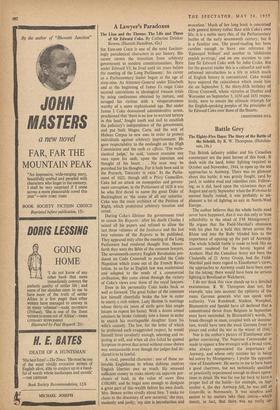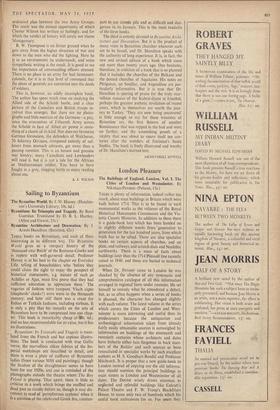Battle Grey
THE British infantry soldier and his Canadian counterpart are the joint heroes of this book. It deals with the hard, bitter fighting required in October and November, 1944, to open up the sea approaches to Antwerp. There was no glamour about this battle; it was grimly fought, yard by yard, in sodden mud and relentless rain. Follow- ing, as it did, hard upon the victorious days of August and early September when the Wehrmacht seemed finally routed, it was probably as un- pleasant a bit of fighting as any in North-West Europe.
The author believes that the whole battle need never have happened, that it was due only to 'iron inflexibility in the mind of FM Montgomery.' He argues that the Field-Marshal's obsession with his plan for a bold thin thrust across the Rhine and into the Ruhr blinded him to the importance of opening up the port of Antwerp. The whole Scheldt battle is made to look like an account rendered for the heroic legend of Arnhem. Had the Canadian Army not been the Cinderella of 21 Army Group, had the Field- Marshal paid more regard to Eisenhower's views, the approaches to Antwerp could have been ours for the taking; there would have been no serious fighting in Beveland or Walcheren.
I do not think this view stands up to a detailed examination. R. W. Thompson does not, for example, take into account the opinions of the many German generals who can speak with authority. Von Rundstedt, Student, Westphal, Blurnentritt and Speidel have all declared that a concentrated thrust from Belgium in September must have succeeded. In Blumentritt's words, 'A break-through in mass, coupled with air domina- tion, would have torn the weak German front to pieces and ended the war in the winter of 1944.' Nor is the author's picture of Eisenhower alto- gether convincing. The Supreme Commander is made to appear a fine strategist with a broad view, who always appreciated the importance of Antwerp, and whose only mistake lay in being
led astray by Montgomery. I prefer the opposite View of Eisenhower. He seems to me to have been a good chairman, but not technically qualified
or practically experienced enough to direct opera-
tions in detail. He was far too far back to have a proper feel of the battle—for example, on Sep-
tember 4, the day Antwerp fell, he was still at Granville in Normandy. It was simplest and easiest to let matters take their course—which meant, in fact, that there was no really co- ordinated plan between the two Army Groups. The result was the missed opportunity of which Chester Wilmot has written so feelingly, and for which the verdict of history will surely not blame Montgomery.
' R. W. Thompson is on firmer ground when he gets away from the higher direction of war and down to the men who did the fighting. Here he is in an environment he understands, and some
)4
sympathetic writing is the result. It is good to see the importance of commanding officers stressed. There is no place in an army for bad lieutenant- colonels, for it is at that level of command that the plans of generals are converted into the deeds Of soldiers.
This is, however, an oddly incomplete book. The author has spent much time on studying the Allied side of the Scheldt battle, and a clear iiicture of the Canadian and British troops in- volved thus emerges. But there are no photo- graphs and little mention of the Germans—a pity, since the evacuation of Fifteenth Army across the Scheldt in face of Allied air power is some- thing of a classic of its kind. Nor does my favourite German formation, the defenders of Walcheren, (70 Infantry Division, composed entirely of suf- ferers from stomach ailments, get more than a passing mention. This is an honest and genuine war history; many Canadians and Lowlanders will read it, but it is not a tale for the African or Mediterranean soldier. You have to have fought in a grey, slogging battle to enjoy reading about one.
A. 3. WILSON































 Previous page
Previous page